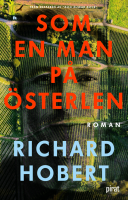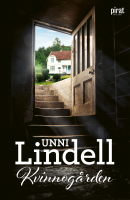Förord amerikanska upplagan – Studio sex
This is the place where my novels are set. It’s a society full of contradictions. It is strange and very ordinary at one and the same time. Since 1932, Sweden has been run almost continually by the Social Democratic Worker’s Party. (The liberals and conservatives have ruled in short terms for a total of nine years over the period). This has, not surprisingly, created some arrogance among the people in power. The Social Democrats started bending the rules early, and then making up their own.
One of the rule-bendings resulted in the illegal espionage organization called the IB. Party spies worked both inside and outside of Sweden for decades. Tens of thousands of Swedes were registered and defined as ”security risks”, which put them at risk of losing their jobs and their elected offices. The crimes these ”security risks” were alleged to have perpetrated included parking their cars too close to the wrong political meeting.
The truth about the IB organization was revealed in May 1973 by two young reporters, Jan Guillou and Peter Bratt, who wrote for the small, alternative magazine FiB. Both journalists where sentenced to a year in prison for the article, making them two of very few political prisoners in modern Swedish history. (Everything turned out fine for the journalists. Today, Peter Bratt is an investigating reporter at the biggest and most prestigious morning paper, Dagens Nyheter. Jan Guillou is the Chairman of the Swedish Publishers Club, and also a best-selling author. Together, we own one of Sweden’s biggest publishing houses, Pirat. Ha ha!)
Everything describing the IB affair in this novel is true, up until the conclusion. But since Sweden is an arms exporting country, who knows? Sweden is militarily neutral. Squeezed between the Nato member-nations Denmark and Norway on one side and Finland and the former Soviet Union on the other, this seemed like the smart thing to do for a long time. Not having any allies during the cold war forced us to maintain a strong national military defense. It also made us build an advanced weapons and arms production infrastructure and the Swedish parliament has agreed to a limited and controlled export of this materiel.
In 1986, the Indian government closed a deal with the Swedish company Bofors, worth SEK 8.4 billion. The Social Democratic government was deeply involved in the agreement. Prime Minister Olof Palme talked the whole deal through in several meeting with Indian Prime Ministers Indira Gandhi and, later, Rajiv Gandhi.
It became clear that Bofors got the order after paying SEK 300 million in bribes. The scandal dominated the Indian election campaign in 1989 and actually caused Rajiv Gandhi to loose his office. (There have been several deaths in the aftermath of this deal that might be quite coincidental. Olof Palme was shot dead in Stockholm on February 28, 1986. The man in charge of controlling the Swedish export of war materiel, Carl Algernon, was killed in a strange accident in the Stockholm subway on January 15, 1987. A Swedish journalist who investigated the Bofors affair, Cats Falck, was found dead in her car on the bottom of the ocean and Rajiv Gandhi was murdered in 1991.)
The role of the Swedish government in this affair is still not clear. The Social Democrats have promised, again and again, to publicly ”wash their dirty laundry” in this matter.
We’re still waiting.
Our society is very well regulated. We don’t mind that Big Brother is watching. Every citizen is given a personal number at birth. This number follows you everywhere: bank accounts, taxes, phone bills, car registration, stocks, employment records and so on. Everybody’s number is published (with very few exceptions, that I will explore in my novel ”The Paradise Trust”) and can be located through the tax office. Using this number, you can find out a man’s income, his wealth, his previous wife’s maiden name and his kids’ grades in math.
Everything about us Swedes is in the official record, but also about the people in power. Every piece of paper lodged with our authorities is public, as well as all the bills and receipts turned in by our officials. Anyone can check every expense incurred by our politicians, union herpes transmission leaders and other authorities.
Still, they cheat. In the 1990’s, an endless line of powerful people were caught going to gambling clubs, brothels, porno theaters and on exotic vacations at taxpayers’ expense. In July 1994, I found a limousine bill that proved that Bjorn Rosengren, the leader of a huge union cartel, had lied about a visit to a porn club during the 1991 election. Rosengren had to resign, and the cartel made it no secret that they thought this was my fault.
These events inspired me to write the novel ”Studio Sex”. Oddly enough, the members of this very union selected me ”Author of the Year” for this book. And everything worked out for Bjorn Rosengren as well. His pals in the Party made him governor of Norrbotten, my home region. Today he’s the Minister of Industry in the Social Democratic government.
All of these affairs have, of course, been brought to the attention of the Swedish people by the media. The Swedes read more newspapers than almost any other nationality, probably because all non-governmental broadcasting was forbidden until the late 1980’s. Until then, we had two state-run TV channels and three state-run radio stations. Broadcast-news programs have always been very strict, official and uncontroversial. Investigative journalism and groundbreaking news have usually been found in the tabloids.
The Swedish evening papers blend the serious and the popular in a way I haven’t seen anywhere else: Investigative work is placed next to celebrity scandals. The papers have a true love-hate relationship with their readers. Swedes love to discuss and question the tabloids and cuss at them, too. Lately, a debate has centered on a mentally disturbed drug addict who was convicted of the murder of Prime Minister Olof Palme in 1989. Later, he was acquitted by the appeal court and is therefore a free man. In the last ten years, the man has received SEK one million from the tabloids and the new commercial TV stations, mainly for giving interviews. This is still not acceptable practice in Sweden and has been strongly condemned by sections of the public. The murder of Olof Palme remains unsolved to this day.
I wish you exciting and thoughtful reading.
Liza Marklund
Avarua, Rarotonga
New Years Day 2002























































